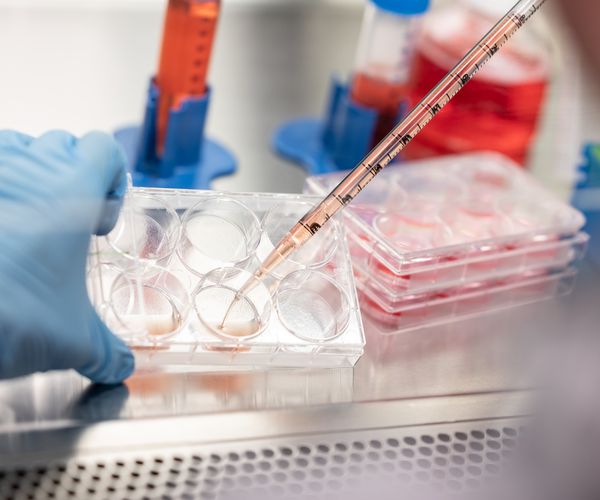Progress in the diagnosis and treatment of amyloidosis has depended upon clinical and laboratory research at Boston University and other amyloid centers around the world. New diagnostic methods and treatment option have given patients with amyloidosis hope for improved quality of life and extended survival.
 Laboratory Research
Laboratory Research
Our laboratory research programs are based in the Alan and Sandra Gerry Laboratory, with vital collaboration among affiliated laboratories at Boston University School of Medicine. Biochemists, biophysicists, cell and molecular biologists and bioinformaticians work to understand:
- What genes and proteins form amyloid?
- How protein aggregation occurs?
- How amyloid deposition leads to cell and tissue damage?
We use high-tech instrumentation and cell and animal models to understand the molecular basis of amyloidosis – in the hopes of translating laboratory findings into better diagnostics and new treatments.
Clinical Research
Clinical research allows us to determine whether new medications are effective, a major goal of our work. Participating in a clinical trials provides access to potential new treatments and paves the way for better treatment for other patients in the future.
The most challenging aspect of AL amyloidosis is the uniqueness of the clonal light chain protein sequence in each patient that contributes to the diverse clinical presentation and disease course. Determination of the protein sequence from many individuals could help to identify light chains that carry an increased risk for amyloid formation and predict the pattern of organ and tissue involvement.
AL-Base, the repository of light chain nucleotide and protein sequences, was initially launched by the team of basic science researchers and bioinformatics experts from Boston University Amyloidosis Center in 2009 with the support of an NHLBI PO1 award, HL68705. It is freely available to academic and industry scientists, as well as the public on the Boston University website at https://albase.bumc.bu.edu/aldb/.
Recent developments in information technology and DNA sequencing techniques have vastly increased the amount of available genomic data over the past decade and dictated an urgent need for both infrastructure and content upgrades for AL-Base. The website and database software were upgraded to modern standards in 2021, with support from the Wildflower Foundation. Since then, newly published light chain sequences have been gathered from multiple recent studies in preparation for an AL-Base content update that is anticipated to go live in 2023.
To take advantage of these new resources, Amyloidosis Center researchers have developed computational methods to derive clonal light chain nucleotide sequences from gene expression data obtained from plasma cell dyscrasia associated disorders. Allison Nau, a new graduate from the Boston University Master’s Program in Bioinformatics worked with Dr. Gareth Morgan, a Research Assistant Professor in the Amyloidosis Center, to carry out this project. Using Boston University’s high performance computing cluster, this new algorithm was used to determine over seven hundred clonal light chain sequences associated with multiple myeloma, a plasma cell malignancy closely related to AL amyloidosis. This new cohort of sequences more than tripled the number of multiple myeloma-associated light chains previously reported in the AL-Base repository. The addition of these sequences to AL-Base will serve as a valuable control on studies carried out by Dr. Morgan and Dr. Prokaeva to identify sequence features that correlate with amyloid deposition in AL amyloidosis. This new method will accelerate the growth of AL-Base and provide an important resource for new approaches both at the Boston University Amyloidosis Center and other institutions involved in amyloid research around the world.
We are grateful to The Wildflower Foundation for supporting this update.
Funding
Our research is supported by the National Institutes of Health, the Food and Drug Administration, the Health Research Services Administration, the American Heart Association, the Amyloidosis Foundation, the Wildflower Foundation, Inc., the Fred J. Brotherton Charitable Foundation, Martin Gruss, and by generous patients, families and friends. Donations can be made through our website or by mail.
